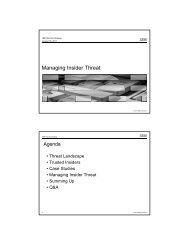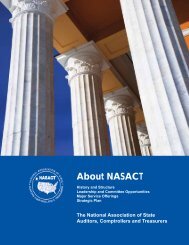Advisory Committee on Tax Exempt and Government Entities (ACT ...
Advisory Committee on Tax Exempt and Government Entities (ACT ...
Advisory Committee on Tax Exempt and Government Entities (ACT ...
You also want an ePaper? Increase the reach of your titles
YUMPU automatically turns print PDFs into web optimized ePapers that Google loves.
The Appropriate Role Of The Internal Revenue Service With Respect To <strong>Tax</strong>-<strong>Exempt</strong> Organizati<strong>on</strong> Good Governance IssuesAPPENDIX 2. FOR-PROFIT CORPORATE GOVERNANCEA. Enr<strong>on</strong>, Sarbanes-Oxley <strong>and</strong> For-Profit GovernanceCorporate governance “best practices” in the n<strong>on</strong>profit sector today borrow heavily fromthe for-profit world. 159 The history of regulati<strong>on</strong>, <strong>and</strong> the pressure for greater selfregulati<strong>on</strong>,in both sectors ebbs <strong>and</strong> flows, emerging most str<strong>on</strong>gly in the face of publicindignati<strong>on</strong> over abuses <strong>and</strong> crises, real or perceived, <strong>and</strong> the belief—or at least hope—that imposing additi<strong>on</strong>al “safeguards” can forestall similar occurrences in the future. 160In fact, it is virtually tautological that a significant failure by an organizati<strong>on</strong> is a failure ofgovernance.The enactment of groundbreaking federal securities laws often was prompted byprofound failure or crisis: 161• The passage of the Securities Act of 1933 162 (the first general federal law toregulate the issuance of securities, requiring am<strong>on</strong>g other things that certainissuers of securities file registrati<strong>on</strong> statements with the Federal TradeCommissi<strong>on</strong> <strong>and</strong> provide a prospectus with specified informati<strong>on</strong> to investors<strong>and</strong> prohibiting misrepresentati<strong>on</strong>s <strong>and</strong> other fraud in the sale of securities)<strong>and</strong> the Securities Exchange Act of 1934 (the first federal law to regulate thetrading of securities, it created the Securities <strong>and</strong> Exchange Commissi<strong>on</strong>,gave the SEC the power to regulate the securities’ exchanges <strong>and</strong> prohibitedinsider trading <strong>and</strong> a number of other trading practice schemes) werepossible <strong>on</strong>ly because of the public’s loss of c<strong>on</strong>fidence in the public marketsafter the stock market crash of 1929 <strong>and</strong> the Great Depressi<strong>on</strong>.• The enactment of the Public Utility Holding Company Act (which gave theSEC power to limit the size <strong>and</strong> organizati<strong>on</strong> of utility holding companies) in1935 was the direct result of unfair practices by gas <strong>and</strong> electric companies,including excessive rates, self-dealing <strong>and</strong> unreliable service that hurtc<strong>on</strong>sumers <strong>and</strong> investors.159See, e.g., supra notes 40, 42-43, <strong>and</strong> 47 <strong>and</strong> accompanying text.160Of course, as today, resources <strong>and</strong> politics play an important role in the extent to which C<strong>on</strong>gress <strong>and</strong> regulators decide to adopt“reforms” <strong>and</strong>/or aggressively enforce existing rules <strong>and</strong> regulati<strong>on</strong>s. Thus, for example, in 1955, the SEC was faced with suchsevere staffing shortages that it issued a memor<strong>and</strong>um encouraging its regi<strong>on</strong>al offices to rely up<strong>on</strong> state authorities to investigate<strong>and</strong> prosecute securities cases. Its resulting ineffectiveness was the subject of criticism by the press (see, e.g., Time Magazine,Protecti<strong>on</strong> for Investors: The SEC is Unequal to the Job, July 16, 1956,http://www.time.com/time/magazine/article/0,9171,936723,00.html) <strong>and</strong> then C<strong>on</strong>gress (see, e.g., Report of the House SelectSubcommittee <strong>on</strong> Legislative Oversight, H.R.Rep. No. 2711, 86th C<strong>on</strong>g., 1st Sess. (1959)) for failing to aggressively prosecutecases, particularly cases against large firms, <strong>and</strong> for failing to uncover the breadth of illegal activity by the American Stock Exchange(“AMEX”) when it brought an administrative acti<strong>on</strong> against a number of members of the AMEX, resulting in relatively light penalties.In 1961, a report requested by President Kennedy <strong>on</strong> federal regulatory agencies, including the SEC, emphasized the importance ofadequate pers<strong>on</strong>nel <strong>and</strong> resulted in increased staffing for the SEC. See http://www.sechistorical.org/museum/timeline/index.php.161See generally, http://www.sec.gov/about/whatwedo.shtml; http://www.sechistorical.org/museum/timeline/index.php;http://www.fuqua.duke.edu/c<strong>on</strong>ference/dei/nyse/docs/cautious_evoluti<strong>on</strong>_or_perennial_irresoluti<strong>on</strong>.pdf .162Despite the cataclysmic events that produced these laws, Wall Street protested the passage of the Securities Act of 1933 byrefusing to bring new stock issues to the market in 1933. http://www.sechistorical.org/museum/timeline/index.php.ADVISORY COMMITTEE ON TAX EXEMPT AND GOVERNMENT ENTITIES (<strong>ACT</strong>) June 11, 2008 79













